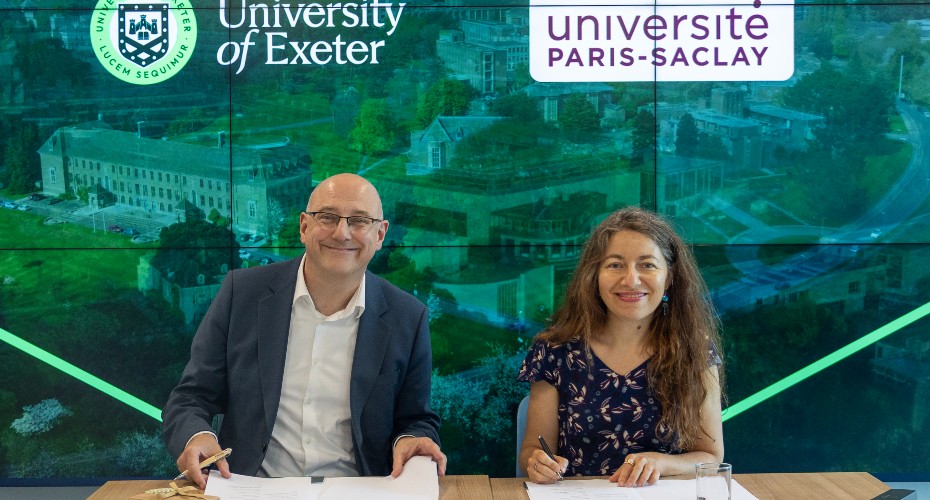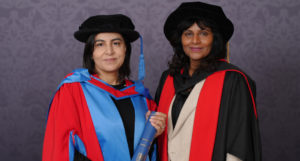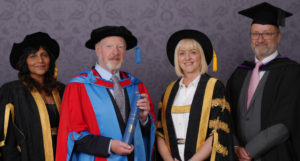University of Exeter and Université Paris-Saclay Launch Strategic Partnership to Drive Bilateral Research, Education and Innovation Excellence

Professor Richard Follett, Vice President and Deputy Vice-Chancellor at the University of Exeter and Professor Delphine Placidi-Frot, Vice President for International and European Relations at Université Paris-Saclay
The University of Exeter and Université Paris-Saclay are embarking on a bold new strategic partnership, designed to drive high-impact collaboration between two of Europe’s most research-intensive institutions.
The three-year partnership will support cutting-edge, faculty-led collaboration across some of the most crucial research themes, seeking solutions to some of the most pressing challenges globally.
These collaborations will centre around research into areas including climate and environmental science, law, social sciences, AI and data science, antimicrobial resistance (AMR), and health, amongst others.
This strategic partnership, built upon a natural alignment of vision, ambition and capability between the two institutions, will help produce structured networks to promote academic and research excellence.
The partnership promises to usher in a bold new era of collaboration between Exeter and Université Paris-Saclay, centred on a co-commitment to delivering real-world impact.
The partnership was ratified during a special ceremony, held at the University of Exeter’s Streatham Campus on July 2nd, 2025. This official launch took place during a high-level, two-day Paris-Saclay delegation visit to Exeter on 2–3 July.
Speaking about the new strategic partnership, Professor Lisa Roberts, President and Vice-Chancellor of the University of Exeter said: “We are truly delighted to be signing our new, ambitious strategic partnership agreement with Université Paris-Saclay.
“Research partnerships such as this are vital in addressing the many global challenges we face and in addressing some of the world’s most pressing issues. Our partnership will drive collaboration across crucial research themes including climate and environmental science, law, social sciences, AI and data science, antimicrobial resistance (AMR), and health.
“The partnership with Université Paris-Saclay represents another significant step forward in Exeter’s global strategy and I am confident that the combination of our resources, networks, and vision to deliver research that truly matters will deliver huge benefits for communities locally and globally.”
At the heart of the agreement is a commitment to joint investment, including a €60,000 per year strategic fund that will fuel:
- Seed funding for new research and education collaborations
- Accelerator grants to scale high-potential projects.
- Graduate research student mobility to foster international talent pathways.
- Professional Services staff exchanges to share best practice and drive institutional learning.
Camille Galap, President of Université Paris-Saclay added: “We are very pleased to sign this strategic partnership with the University of Exeter, allowing our communities to accomplish ambitious teaching and research projects together. This bilateral funding will complete the existing dual PhD programme which has successfully been in place for the past two years between our institutions.
“Our strengthened relationship is particularly timely now that the University of Exeter and the European University Alliance in Global Health (EUGLOH), coordinated by Université Paris-Saclay, are considering associating Exeter to the Alliance.”
This initiative enhances existing Exeter–Saclay activity, including the jointly funded Double PhD degree programme. Formulated in 2023, the programme has allowed Exeter & Paris-Saclay to collaboratively deliver a series of double PhD degree projects, with co-supervision.
The universities offer joint funding to provide tuition, living, travel and research costs, and the opportunity to obtain two PhD awards from both Exeter and Paris-Saclay.
It also creates a springboard for UK–France–EU external funding opportunities — such as the Sophie Germain Programme and upcoming bilateral research calls.
Professor Richard Follett, Vice President and Deputy Vice-Chancellor at the University of Exeter, said: “This landmark partnership between the University of Exeter and Université Paris-Saclay represents an exceptional opportunity to both deepen international links, and deliver high-impact research through collaboration between our world-leading researchers.
“Together we will develop innovative approaches to tackle major challenges faced by communities across the globe, in areas such as health, antimicrobial resistance, climate science, AI and data science and international law.”
Professor Delphine Placidi-Frot, Vice President for International and European Relations at Université Paris-Saclay added: “This partnership will reinforce long-standing scientific cooperations between our academics while enlarging their scope and intensity, ranging from environment and health to social sciences or artificial intelligence.
“Our two universities are very much committed to interdisciplinary research and training, and this partnership will provide us with opportunities to increase our chances of success by jointly responding to calls for projects, particularly European ones, in coherence with the scientific priorities defined by the recent UK-France Joint Scientific Commission (COMIX).
“It was also made possible and tailored by talented and dedicated teams from both sides which I want to warmly thank here for their work, because this is also the goal and the spirit of such sustainable strategic partnerships: bring academic communities together in a lasting way around collaborative projects.”
The visit also coincided with a collaborative research workshop at Exeter’s Penryn Campus in Cornwall. The event, supported by the French Embassy in London, brought together academics from the Écologie, Société, Évolution Laboratory (ESE – Univ. Paris-Saclay, CNRS, AgroParisTech) and Exeter’s CEC and DEES, to explore intersections between ecology, governance, restoration, climate change, and data science.



